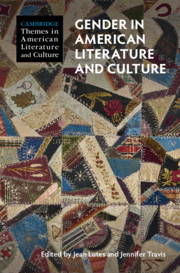Book contents
- Gender in American Literature and Culture
- Cambridge Themes in American Literature and Culture
- Gender in American Literature and Culture
- Copyright page
- Contents
- Contributors
- Acknowledgments
- Introduction
- Part I Intimacies
- Chapter 1 The Price of Freedom
- Chapter 2 Post-Reproductive Female Sexuality and the Early American Novel
- Chapter 3 The Effeminate Man in Nineteenth-Century America
- Chapter 4 Rereading Puritan Masculinity through Trans Theory
- Chapter 5 “Unbounded Grief”
- Chapter 6 Rethinking Reproductive Freedom through Transpacific Narratives
- Chapter 7 Slow Emergency
- Part II Aggressions
- Part III New Directions
- Bibliography
- Index
Chapter 7 - Slow Emergency
Life Writing, Dementia, Gender, and Care
from Part I - Intimacies
Published online by Cambridge University Press: 01 April 2021
- Gender in American Literature and Culture
- Cambridge Themes in American Literature and Culture
- Gender in American Literature and Culture
- Copyright page
- Contents
- Contributors
- Acknowledgments
- Introduction
- Part I Intimacies
- Chapter 1 The Price of Freedom
- Chapter 2 Post-Reproductive Female Sexuality and the Early American Novel
- Chapter 3 The Effeminate Man in Nineteenth-Century America
- Chapter 4 Rereading Puritan Masculinity through Trans Theory
- Chapter 5 “Unbounded Grief”
- Chapter 6 Rethinking Reproductive Freedom through Transpacific Narratives
- Chapter 7 Slow Emergency
- Part II Aggressions
- Part III New Directions
- Bibliography
- Index
Summary
This chapter considers how Alzheimer’s narratives written by and about women are using literary forms to explore the relations among gender, personhood, and care. Feminist theory has developed a powerful arsenal for challenging ageism directed toward the female body and the social devaluation of aging women but has been less adept at reframing narratives about dependency and cognitive change that inevitably come with advanced age, and are amplified by age-related Alzheimer’s. I argue that narratives Gerda Saunders and Elinor Fuchs highlight the limitations to our current ways of imagining the gendering of age-related dependency, and offer ways of thinking otherwise. I am particularly interested in how narrative portrays the temporalities of dementia; how individual narratives manage the formal challenges of representing a self that is in the process of being irrevocably transformed; and how, in the bleakest situations, care givers and receivers find glimpses of unexpected intimacy, compassion, and interconnection.
- Type
- Chapter
- Information
- Gender in American Literature and Culture , pp. 110 - 124Publisher: Cambridge University PressPrint publication year: 2021
- 1
- Cited by

